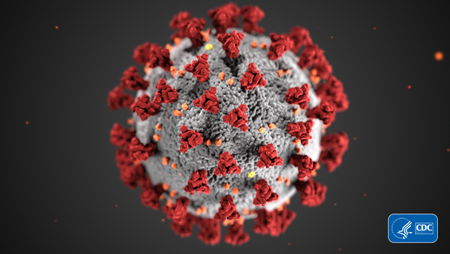
COVID-19, or coronavirus disease 2019, is a respiratory illness that can spread from person to person. An outbreak of the virus that causes COVID-19 was first detected in Wuhan City, Hubei Province, China in December 2019, with widespread cases found internationally, including the U.S.
COVID-19 Vaccination
- Denver COVID-19 Vaccine Data Summary
- Get the COVID-19 Vaccine at the Immunization Clinic
- Get the COVID-19 vaccine in Colorado
- COVID-19 vaccine frequently asked questions
- CDC COVID-19 vaccine information
COVID-19 Case Data
What are coronaviruses?
Coronavirus refers to a family of viruses that have a crown-like ("corona") appearance that cause disease in animals and humans. In humans, coronaviruses cause respiratory tract infections that are typically mild, like the common cold. Some coronaviruses seem more severe, including severe acute respiratory syndrome (SARS) and Middle East respiratory syndrome (MERS).
How is it spread?
- Mainly person-to-person through respiratory droplets and aerosols.
- Symptoms may appear 2-14 days after exposure.
What are the symptoms?
People with COVID-19 have had a wide range of symptoms reported, ranging from mild to severe, and sometimes death. Symptoms may appear 2-14 days after exposure to the virus. According to the CDC, people with the below symptoms, or combination of symptoms, may have COVID-19:
- Cough
- Shortness of breath or difficulty breathing
- Fever
- Chills
- Repeated shaking with chills
- Muscle pain
- Fatigue
- Diarrhea abdominal pain or discomfort
- Congestion or runny nose
- Headache
- Sore throat
- New loss of taste or smell
- Nausea, vomiting and/or severe lack of appetite
Symptoms in children are similar to adults and they generally have mild illness. Please note that this list is not all inclusive. Be sure to consult your medical provider for any other symptoms that are severe or concerning to you.
What do I do if I think I have COVID-19?
- If you are having symptoms, it is recommended that you stay home from work or school, avoid close contact with others, avoid going out in public, and monitor your symptoms.
- Get tested. Even if your symptoms are mild. If your test result is positive, please follow the CDC's Isolation and Precautions for People with COVID-19.
- If your symptoms worsen, please call your doctor in advance and notify someone as soon as you arrive to avoid the possibility you may spread illness to others.
Warning signs - when to call 911:
- Severe difficulty breathing
- Chest pain
- Feel like you aren’t thinking as clearly as you should be
Where can I go to be tested?
What can you do to prevent COVID-19?
We continue to encourage people to follow the same guidance we all know for reducing your risk of getting any respiratory virus, like the flu and colds each year:
- Wear a mask.
- Maintain social distancing of at least 6 feet from people who aren’t members of your household.
- Wash your hands often with soap and water for at least 20 seconds.
- Use an alcohol-based hand sanitizer that contains at least 60% alcohol if soap and water are not available.
- Avoid touching your eyes, nose, and mouth with unwashed hands.
- Avoid close contact with people who are sick.
- Stay home (especially when you are sick).
- Cover your cough or sneeze with a tissue, then throw the tissue in the trash.
- Clean and disinfect frequently touched objects and surfaces.
- Get vaccinated against COVID-19 and Flu.

